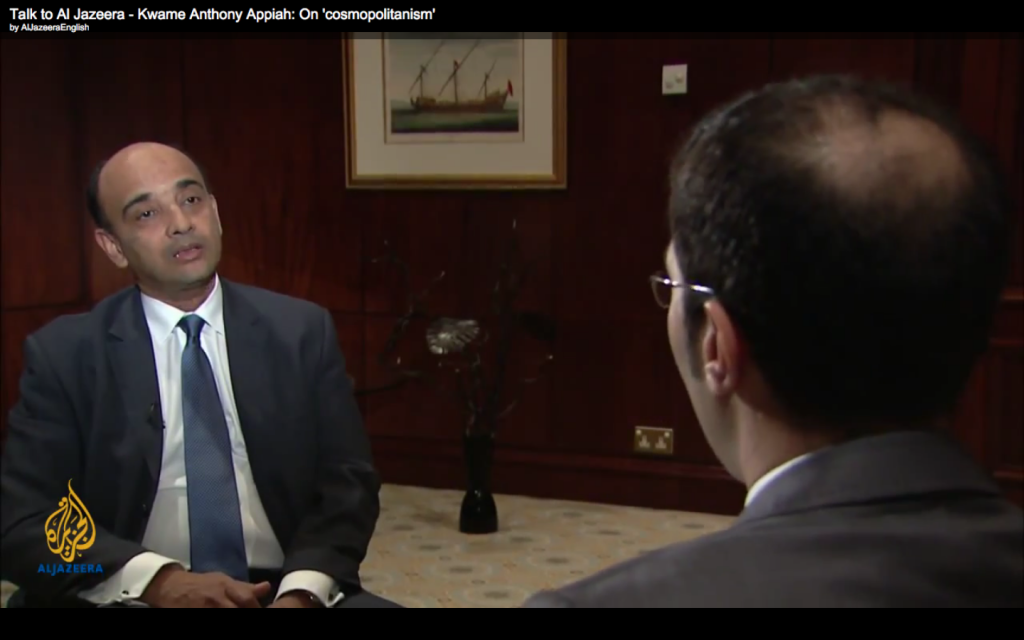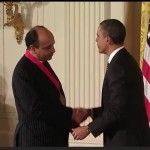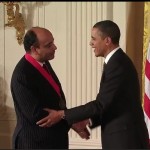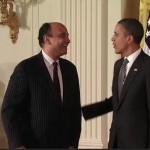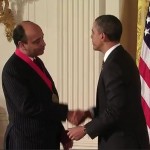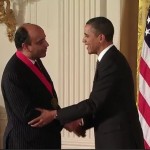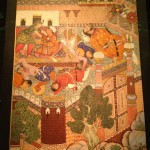A conversation with Al Jazeera English
Sami Zeidan and I talked about cosmopolitanism in Doha a little while ago and Al Jazeera has now aired our discussion.
An Afternoon at the White House
I had the very great honor of being awarded the National Humanities Medal today by President Obama, in the company of people for whom I have the most enormous respect: John Ashbery, poet extraordinary and genial companion; Amartya Sen, one of the deepest philosophers of our age and, in part because of that, one of the most important figures in shaping modern economics; Charles Rosen, musician and historian and theorist of music (also a great humanist in so many other ways) … I could gloss each of the others with such respectful epithets.
Various people in my family asked what it was that the President said to me. What I remember is that he said that he had wanted to call his first book “In My Father’s House” but that I had already taken that title. (I should have had the presence of mind to say that my book would have been called “The Invention of Africa” if Valentin Mudimbe had not already taken that title … so he should have been complaining to Valentin.)
Here are just a few pictures of the event, courtesy of Jonathan Finder, my brother-in-law:
National Humanities Medal
- Kwame Anthony Appiah
- John Ashbery
- Robert Darnton
- Andrew Delbanco
- National History Day
- Charles Rosen
- Teofilo Ruiz
- Ramón Saldívar
- Amartya Sen
You can follow along live here: http://www.whitehouse.gov/Live
As I said to my sisters this morning, it tells you something about how small the world is (and how big-hearted America can be) that one medal awardee (from India) is married to the cousin of another (from Ghana and England!)
We just got back from a visit to the Georgetown University campus in Doha in Qatar, where I gave a public lecture and talked to a couple of very interesting classes. We had time to look around a bit. Here’s the amazing I. M. Pei Museum of Islamic Art and a couple of its contents, followed by a few sights of the city and its environs.
Georgian Edition of “The Honor Code.”
Radarami has been granted the right to do a Georgian edition of “The Honor Code.” For those of you who read Georgian, here is their website.
The Chinese Edition of The Honor Code is now out: 荣誉法则: 道德革命是如何发生的
And here, in English, is the preface I wrote for it:
Friends and Strangers: For my Chinese Readers
Towards the end of the Second World War, a committee chaired by the wife of the British Minister of Finance, Sir Stafford Cripps, undertook a campaign to raise money for famine relief in China. The project was called British United Aid to China (BUAC), and it raised about 3 million British pounds … the equivalent, in today’s terms, of nearly US$150,000,000. China was dealing with the suffering caused by many years of war and people in Britain responded to that suffering: but there is something very moving about the way that hundreds of thousands of British people, living themselves with rationing, their capital full of bombed-out buildings, their economy facing the prospect of many years of rebuilding from a long war, reached into their pockets to help people half a world away.
The aim of the campaign was to help the Chinese people, not to interfere in the struggle between the Red Army and the Republicans, and so the money was sent for famine relief on both sides. In 1946, the Chinese government invited the BUAC to send a delegation to see what had been done with the money they had sent. And so, in 1946, Lady Cripps and her daughter, Peggy, along with a small group of colleagues, spent three months traveling all around China, covering some 30 thousand miles in both Communist and Republican areas. They met Mao Zedong, Zhou Enlai, and Zhu De and his wife Kang Keqing, in Yenan; they stayed with Chiang Kai-shek and his wife in Chungking. They visited Shanghai and Beijing and scores of small towns and villages. And the visit made a lasting impact on them. For the next thirty years—until she was 86 years old—Lady Cripps was Chair of the Sino-British Fellowship Trust, an organization that supported British scholars working in China and Chinese scholars visiting the United Kingdom. And her daughter talked often for the rest of her life, too, about the powerful impression that the Chinese people had made on her.[1]
Lady Cripps and her daughter Peggy were my grandmother and my mother. That is why I know this story. And as a result, my sisters and I grew up with China very much in our conversations and on our minds. In the 1970’s my grandmother traveled to Hong Kong to meet some of the scholars that the program had supported and brought back for me a silk embroidery of a dragon that hung in my bedroom at her house and that hangs today in the hall of my home in the United States. On the floor in my house is a rug with an image of the Long March, given by Chairman Mao to my grandmother. In my high school years, during the Cultural Revolution, I had a subscription to an English language publication called the Peking Review, that came from the Chinese Embassy in London to my school. I may never have been to China, but China has always been a big part of my world.
So when, as a scholar, I began to think about the ethical consequences of globalization, it was natural for me to turn to the history of the relationship between Chinese and Western intellectuals, as it developed through the later nineteenth century when China began to deal directly with American and European governments on a regular basis. That period of European imperialism involved many outrages, from the Opium Wars to the sacking of Beijing, but it also produced a small group of Europeans and Americans, some of them Christian missionaries, living around China, who learned classical Chinese and developed a profound respect for the culture, including the Confucian intellectual traditions that shaped the life of the literati and the rulers and percolated through the experiences of many less exalted Chinese people.
The Western outrages and these Westerners who respected China were both important in the processes that shaped modern China. When intellectuals like Kang Youwei, who figures largely in this book, began to reflect on what was needed to strengthen China so that it could no longer be bullied by British gunboats or Western or Japanese armies marching into her cities, they were responding to the outrages. But their conversations with these Sinophile Westerners helped them to understand the intellectual traditions of the West and so to develop a more sophisticated response. In thinking about other peoples’ ideas, they deepened their understanding of their own traditions. They did not abandon Chinese traditions; they sought to reform them in the light of what they could learn in a dialogue with Europe and America.
One aspect of their response, which I discuss in this book, was their recognition that certain Chinese practices—footbinding, among them, but also, for example, the use of opium—were not only bad for China but were also bad for China’s image among foreigners, especially among the foreigners who knew their country best and respected it most. The growing conviction among the literati that footbinding had to be brought to an end was not the result of an abandonment of Chinese traditions: after all, Confucius had not known of the practice, and criticism of the damage it did to girls and women began in at least the Sung dynasty, not long after footbinding began. But it did grow out of reflection on China’s traditions in the light of a dialogue with respectful outsiders.
Learning about the role of this dialogue between Chinese intellectuals and Westerners in the moral revolution that ended a millennium of footbinding has reinforced in me the conviction that it is often a positive development when friends in other societies—people who are, thus, both friends and strangers—help us to see that there is a need for reform at home. When, in the past, friends pointed to America’s terrible treatment of black slaves or the denial of rights to their freed descendants, they helped recall us to our better selves. Thomas Jefferson wrote, in the American Declaration of Independence, of having a “decent respect to the opinions of mankind.” When friends outside the United States criticize our abuse of the human rights of captives in Guantanamo, or the appalling conditions in our prisons, or the contempt for justice displayed in the administration of the death penalty in our country, some of us, at least, recognize that it is because they respect us—because they are friends as well as strangers—that they are concerned when we betray what is best in our own culture and traditions.
Nations, like individuals, can do things that both gain and lose the admiration and respect of others. To care for your honor, I argue in this book, is to be concerned that you behave in ways that deserve respect. Chinese patriots, like American patriots, like patriots everywhere, care for the honor of their country. You need not worry about those outsiders who do not know how to judge China fairly, those who live with an ignorant contempt for China. But if you care about your nation’s honor you have to be concerned when those strangers who are also friends—people who know and care about China—lose their respect for you. They may be making a mistake, in which case you will tell them, as friends, why what you are doing is not a reason to lose respect for you. But sometimes they will be right, as critics of America’s treatment of our prisoners in Guantanamo or Abu Ghraib are right; and then, if you care about your nation’s honor, you will work to change your country so that it is worthy of your own respect as well as the respect of your friends around the world.
That is one of the reasons why I think honor is so important for our global conversations, for the necessary discussions across societies that will allow us to build a peaceful world in which we can solve together the problems that face us all. Our polluted environment, global pandemics like HIV/AIDS, the challenges facing our inter-connected economies: all these need a world of strangers who are also friends.
Some years ago I wrote a book about the ethical significance of globalization, in which I offered a defense of what in Europe and America is called cosmopolitanism. In it, I suggested that if we are to live securely in a world of strangers, we have to think of each other, at least some of the time, as fellow-citizens of the planet, who have much in common but who also accept that we have the right to live differently. When my grandmother set out, with many others, to help the Chinese people, she was thinking as a cosmopolitan. When my mother and father—she from England, he from Ghana—married each other, they took a step in the same cosmopolitan direction. And when my dying father left a message for his children, in which he asked us always to remember that we were citizens of the world, he was inviting us to follow this family tradition. He was a Ghanaian patriot and a loyal son of Africa—his autobiography is called “The Autobiography of an African Patriot”—but he was also convinced that he had a duty to people of every nation.[2] In this book, I have tried to point to one way in which people across nations have helped each other find their way. I am trying to live up to my father’s final instruction; trying to follow in the footsteps of my mother and grandmother.
And so a successful Chinese future is important for me, and for all China’s cosmopolitan friends; and so is hearing from China, both about what you admire in the world outside and about what troubles you. The respectful conversation that Kang Youwei had with his Western fellow-intellectuals was one in which they were learning from him just as he was learning from them. I offer this book in its Chinese translation as a small contribution to that continuing conversation, hoping to learn much from the responses of my Chinese readers, hoping you have something to learn from me. If we are bound, in one sense, to remain strangers, I hope that, in other sense, we can also become friends.
More Legal Progress for Women’s Rights in Pakistan
In an email from the Equal Rights Trust, excerpted below, there is good news for further legal reform in Pakistan. There are new criminal penalties for a variety of practices that have been used in the past to oppress women. As I argued in The Honor Code, there’s obviously more to real reform than changing the law. But it’s a start. Now they need to enforce it.
“On 12 December 2011, the Pakistani Parliament passed the Acid Control and Acid Crime Prevention Bill and the Prevention of Anti-Women Practices (Criminal Law Amendment) Bill. Both Bills provide for amendments to be made to the Pakistan Penal Code 1860. The amendments seek to protect women and children against acid attacks and prevent other practices which discriminate against women, including forced marriages.”
KAYAK and “All-American Muslim” … a question of tone
Robert Birge, the chief marketing manager of a company called KAYAK, found himself having to defend his company from accusations of religious bigotry because they stopped advertising on a program called “All-American Muslim.” I’m as against giving in to appeals from crazy religious bigots as the next All-American liberal, but I’ve no reason to doubt his explanation. What caught my eye, though, was a demonstration of how an executive in defense mode, can sometimes lose track of the tone of what he is saying. After commenting on the “vitriol” in many of the emails from the Islamophobes, he wrote: “Many of the emails I’ve received expressing disappointment in our decision have been much more civil, and I applaud you for that.” And then, as Frank and Nancy might have said, he went and spoiled it all by adding: “Lastly, I watched the first two episodes. Mostly, I just thought the show sucked.” Civility towards me, excellent; civility to others, apparently, not so much.
My guess—that’s all it is—is that Mr. Birge was so hot under the collar about the accusations of bigotry that his internal editor blew its top. But it says something good about where we are in America today that he knew he had to defend his company from the allegation that it harbored anti-Moslem bigots.
Grading Obama
A journalist from The Root asked me some questions on my views about the President. Rather than answering them separately, I sent an email, whose contents are below. Excerpts appeared on TheRoot.Com.
When President Obama was elected I told my friends that we were going to have to get used to disagreeing with a president we liked. This wasn’t because I was especially cynical about him. It was because it seems to me the presidency is a very constrained office and it is extremely hard, even when you have both houses controlled by your party, to get things done. Despite these difficulties President Obama did, in fact, get a great deal accomplished in the first years of his term, including a revolutionary reform of the government’s role in healthcare provision, and, more recently, a final withdrawal from Iraq. (Both of these things are good for America, I believe, and the first was especially good for black America which is disproportionately underserved by our current healthcare system.) Nevertheless, I believe I have been proved right. On many topics, whatever his own private convictions, the President has done pretty much what a Republican (or most other Democrats) would have done, in ways that are a good deal more conservative than his campaign rhetoric. In dealing with the financial crisis, for example, so it seems to me, his administration has done too little for the poor and too much to please the masters and mistresses of the world of finance. (This is not a particularly original observation: what’s puzzling is that it is apparently controversial in some quarters.)
The presidency also leads even those who are instinctively suspicious of an over-reaching executive to seek to enlarge and protect powers that are democratically suspect: the persistence of Guantanamo and the President’s insistence that he has the right to assassinate US citizens overseas are examples of this, examples that do not distinguish him from others, both Democrat and Republican. I have too little confidence in my own grasp of what is actually possible in the poisonous atmosphere in Washington today, to know whether Barack Obama could have achieved more of the progressive aims I hoped he stood for. And, if I am disappointed, I am not, for the reasons I have mentioned, very surprised. Given the ways in which African-Americans have been disproportionately affected by the Great Recession, the failures of the administration to deliver particularly for the worst of have been particularly unhelpful for that part of the population. As I wrote in the current New York Review of Books, “For example, the median net worth of white families—which stood at a little under $150,000 in 2007—fell by about a third. For black families, who started with a median net worth a little under $10,000, the corresponding fall was close to four-fifths. At the end of the recession, then, the median white family had a net worth of about $100,000; the median black family could claim a mere $2000. Unemployment for people between 16 and 19 years old rose to about 27 percent in the depths of the recession; but the black rate was about double that. Meanwhile, as the recession was beginning, the incarceration rate in the United States rose, for the first time, to one percent. But where for white adults the rate was about one in ninety-nine, the rate for black adults was one in fifteen.”
A weakened President with the House in enemy hands and a majority in the Senate that can be stopped by the rules of that body from doing almost anything is no doubt not in a good position, whatever his own racial identity, to counteract the long-term resistance of most Americans to grasping that we need to do something serious about the racial dimensions of inequality. Those who complain on this account should probably not focus their objections on the President.
An Early Snow Storm
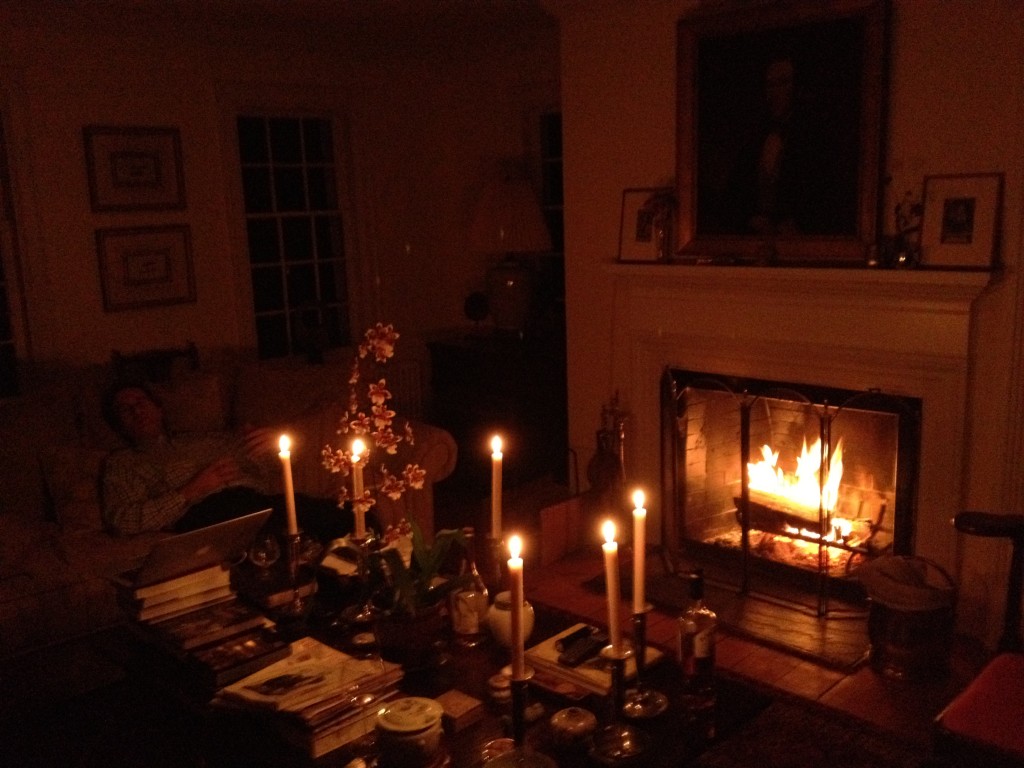 The weather the weekend of the 29th and 30th of October caught us and our electricity company off guard. Fortunately, we can cook with gas: and so, after a delicious candlelit dinner, we retired to the sitting room and read poetry to each other in front of a blazing fire. Thomas Hardy, James Fenton, A. E. Houseman. Despite the modernity of the poems, it felt like a quick trip back to the 18th century, when the house was built … though the iPhone Kindle was our one non-print source!
The weather the weekend of the 29th and 30th of October caught us and our electricity company off guard. Fortunately, we can cook with gas: and so, after a delicious candlelit dinner, we retired to the sitting room and read poetry to each other in front of a blazing fire. Thomas Hardy, James Fenton, A. E. Houseman. Despite the modernity of the poems, it felt like a quick trip back to the 18th century, when the house was built … though the iPhone Kindle was our one non-print source!

